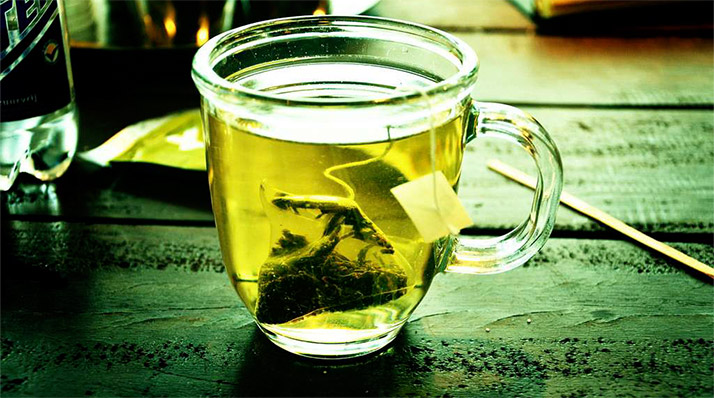


Decreasing intake of salt, doing exercise and consuming garlic are some of the things that help in lowering blood pressure. According to studies, high blood pressure has been attributed as one of the reasons of heart attack. Due to this, people take many things to reduce their blood pressure. The article is about the results of the research done on how green tea affects the blood pressure and certain other interesting facts.

When talking about green tea and blood pressure relationship, green tea is excellent at lowering blood pressure. According to a report, it was found that consuming green tea for 12 weeks daily resulted in a 2.5 mmHg reduction in systolic numbers and a 2.1 mmHg reduction in diastolic numbers.
How Green Tea Helps?
Green tea is obtained as an extract from the leaves of the plant Camellia Sinensis. It’s a rich source of polyphenols including catechins and epigallocatechin gallate (EGCG) and vitamins A, C, D, B5, K, E, chromium, manganese, zinc and selenium.
It is not clearly known as to how it acts; however, it is important to know that it does act. According to studies, ingredients present in green tea relax the smooth muscles of blood vessels, thereby, preventing high blood pressure. Moreover, it also prevents the formation of thrombus and blood clots, thus making the flow of blood easy.
According to a study conducted in the year 2014, regular consumption of green tea resulted in reduction of systolic blood pressure by 1.95 mmHg and total cholesterol by 0.144 mmol/l in the study participants. In another study extract of green tea was used. To study green tea & blood pressure link, two groups of 56 hypertensive and obese patients were given 379 mg capsule or placebo tablets for three months. It was found that both diastolic and systolic numbers were reduced in subjects taking green tea capsules. Moreover, green tea had beneficial effects on inflammation, oxidative stress and cholesterol levels–all of these play a role in the development of hypertension.
It has been reported that a reduction of as little as 2 mmHg can result in 5% decrease in chances of heart disease, 4% decrease in chances of general mortality and 8% decrease in chances of stroke.
To obtain these benefits, you are required to drink about 3-4 cups of green tea each day.
After discussing green tea & blood pressure relationship, let’s discuss other natural ways to lower your blood pressure.
1. Lose Extra Weight
Blood pressure increases with increased weight. Obesity and overweight may also result in sleep apnea that can also raise blood pressure. Losing weight is among the effective lifestyle change that you can make to control your blood pressure. Shedding only 10 pounds can help in reducing the blood pressure.
Apart from losing weight, you should also maintain your waistline. People who carry excessive weight around their waist are at higher risk of developing high blood pressure. The risk of males is increased if their waist measures more than 40” and the risk of females is increased if their waist measure more than 35”.
2. Do Regular Exercise
Doing regular exercise at least half an hour every day can reduce your numbers by 4-9 mmHg. Consistency is important because in case you stop physical activity, your numbers will rise again.
The best kind of exercises that you can do to lower blood pressure are walking, swimming, cycling, dancing and jogging. You can also do strength training. Consult your physician about forming an exercise plan.
3. Eat a Healthy and Well Balanced Diet
Consuming a diet which is rich in fruits, vegetables, dairy products (low-fat), and whole grains and low in cholesterol and saturated fat can reduce your numbers by up to 13-14 mmHg. This type of diet is referred to as DASH (Dietary Approaches to Stop Hypertension) diet.
You can take the following tips to eat a healthy diet:
4. Reduce Intake of Sodium
Even a little reduction of sodium can lower your numbers by 2-8 mmHg. In general, the intake of sodium should be limited to not more than 2,300 mg per day. But, individuals who have greater sensitivity to salt should limit their intake further to 1,500 mg per day. These include:
Consider the following tips to reduce sodium:
5. Limit Your Alcohol Consumption
Alcohol is both bad and good for the health. If taken in small quantities, it can reduce your numbers by 2-4 mmHg. However, this protective effect of alcohol is lost if it is taken in excessive amounts–generally greater than 1 drink a day for females and for males above age 65 years or greater than 2 drinks a day for males of age 65 or young. 1 drink is equal to 5 oz of wine, 1.5 oz of 80-proof liquor or 12 oz of beer.
If you drink greater than moderate quantity of alcohol, your blood pressure can be raised by many points. Moreover, the effectiveness of your blood pressure medicines may be reduced.
6. Quit Smoking
The blood pressure is increased for several minutes after a person finishes smoking a cigarette. The blood pressure is returned to normal by quitting smoking. By quitting smoking, you increase your life expectancy substantially regardless of your age.
7. Reduce Your Intake of Caffeine
The effect of caffeine on blood pressure is debatable. Though what effects chronic consumption of caffeine has on blood pressure is not clear, still, there exists a possibility that the blood pressure may increase slightly by it.
To check whether your numbers are affected by caffeine, check your blood pressure within half an hour of consuming a caffeine containing beverage. In case your numbers are increased by 5-10 mmHg, you are sensitive to caffeine’s blood pressure increasing effects. Consult your physician regarding the affect caffeine has on your blood pressure.